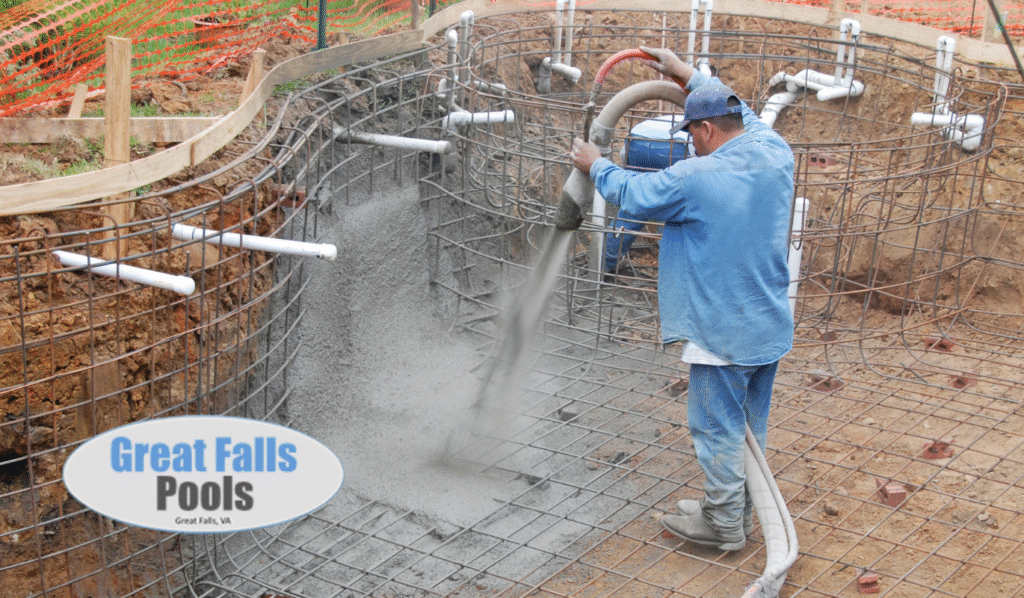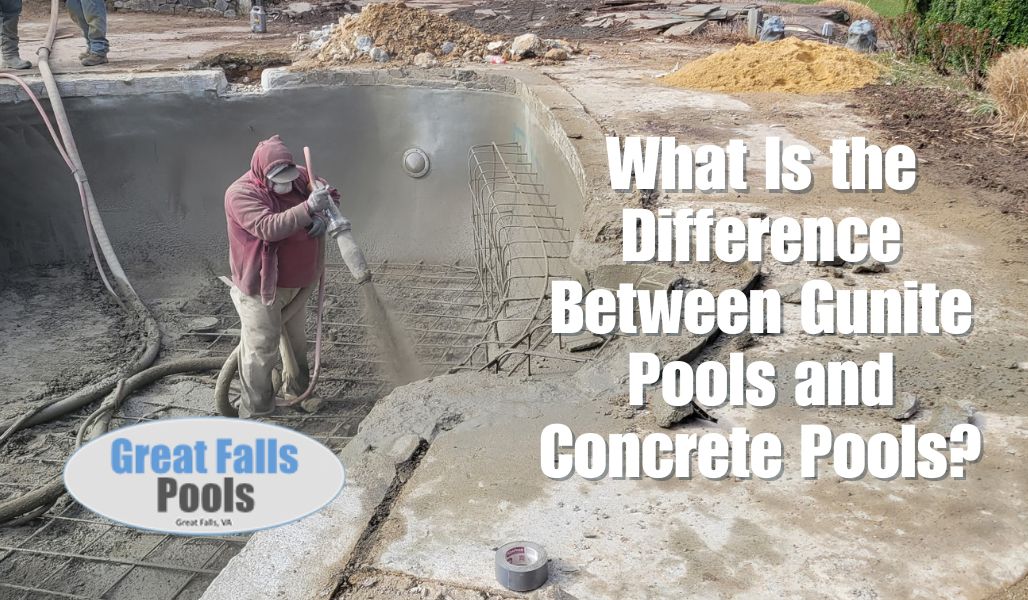If you’re building or renovating a pool in Virginia, Maryland, or Washington, DC, you’ve likely asked: What is the difference between gunite pools and concrete pools? The terms are often used interchangeably, but they’re not exactly the same. Understanding the difference can help you choose the right option for your home and budget.
In this guide, we’ll break down how gunite and concrete pools are built, how they hold up over time, and what sets them apart.
Let’s Talk About Concrete Pools
Concrete is the foundation of many in-ground pools. It’s a mixture of cement, sand, water, and gravel or crushed stone. This mix is poured into pre-built forms or molds that shape the pool. Once it hardens, it becomes strong and durable.
- Pros: Durable, widely available, good for simple shapes
- Cons: Limited design flexibility, more prone to cracking
Concrete pools are a solid choice, especially for basic pool layouts. But because the mix is poured and shaped using forms, you don’t get much wiggle room in terms of design. If you’re dreaming of a pool with curves, built-in seating, or a more custom layout, concrete might feel a little rigid.
What Makes Gunite Pools Different?
Gunite is actually a type of concrete, but it’s applied in a totally different way. Instead of being poured into molds, gunite is sprayed through a hose using high pressure. The dry cement and sand are mixed with water at the nozzle, right before application. This process is called pneumatic application.
Here’s what sets gunite apart:
- It’s sprayed over a steel rebar framework, creating a solid, reinforced shell
- It sticks well to curves and angles, making custom shapes much easier
- It forms a dense, strong surface that resists cracking and shifting
- Pros: Superior strength, flexible design, great for custom pools
- Cons: Slightly more expensive, requires expert installation
Because of the way it’s applied, gunite is the go-to option for high-end pools. If you’ve ever seen a resort-style pool with natural rock features or built-in spas, chances are it was made with gunite.
Which Pool Type Lasts Longer?
Both gunite and poured concrete are strong and long-lasting. But gunite generally holds up better under pressure—literally. Its dense structure can better resist soil movement, water pressure, and freeze-thaw cycles.
With proper maintenance, either pool can last 20 to 30 years or more. The key is resurfacing and regular care.
(Need help with that? Contact us today to schedule expert pool service in your area.)

Resurfacing Your Pool: Timing Matters
Whether you go with gunite or concrete, every pool surface will eventually need resurfacing. Most pools need it every 10 to 15 years, depending on the finish. Signs it’s time include:
- Rough or flaking surfaces
- Stains that don’t scrub out
- Exposed rebar or cracking
Gunite tends to show wear a little more slowly, but both pool types benefit from a resurfacing schedule. If you’re curious about timelines or want to explore finish options, check out our post: How often should you resurface your pool.
What About Design and Aesthetics?
If your vision includes curves, beach entries, tanning ledges, or a fully custom layout, gunite gives you more freedom. The spraying method allows builders to shape the pool right on-site, adjusting details as they go.
Concrete designs are more limited due to the use of molds, but they still offer flexibility in terms of size and depth.
So, Which Should You Choose?
Here’s a quick recap:
| Feature | Gunite | Concrete |
|---|---|---|
| Strength | Excellent | Good |
| Design Flexibility | High (custom shapes) | Medium (form-based) |
| Crack Resistance | Better | Moderate |
| Application Method | Sprayed over rebar | Poured into molds |
| Cost | Slightly higher | Often more budget-friendly |
If your budget allows and you’re looking for something unique and long-lasting, gunite is usually the winner. But if you’re going for a classic look and keeping costs down, concrete is still a reliable and strong option.
Trust Great Falls Pools for Expert Advice
At Great Falls Pools, we bring decades of experience to every project. Whether you’re planning a new build or renovating an older pool, our team helps you choose the best materials and techniques for long-term value.
We proudly serve customers throughout Virginia, Maryland, and Washington, DC. Want to stop by or see where we’re located? Find us on Google Maps.
Still have questions about the best pool type for your yard? Contact us today for expert guidance and a personalized consultation.



